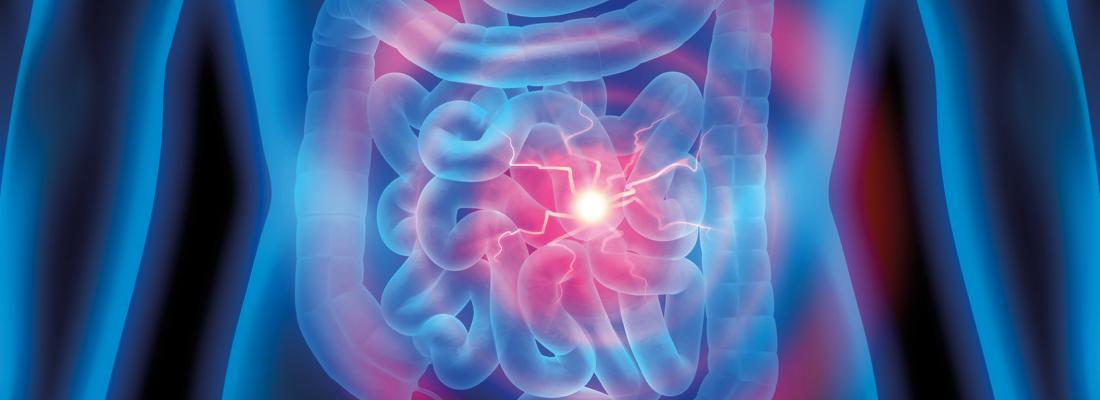Food, Global Health Reading time 2 min
A rationale for dual therapy in the treatment of ulcerative colitis
Published on 09 September 2021

Ulcerative colitis is a chronic disease that affects one in 500 people in North America and Northern Europe, and is on the rise in developing countries. Usual therapies aim to suppress inflammation, but lead to a low remission rate and do not prevent relapses. It has been shown that replacing a patient's altered microbiota with the microbiota of a healthy person can lead to remission. However, the results of "faecal microbiota transplantation" are highly variable, and the reasons for this are not well understood.
By focusing on the molecular dialogue between humans and their gut microbiota, essential in maintaining health, INRAE scientists are providing a new vision1. The model developed in this study shows that complete remission of the disease requires both the elimination of inflammation and the reconstitution of a healthy microbiota.
The discovery of different disease states
Scientists analysed data on the microbiota and the degree of inflammation of 353 patients suffering from ulcerative colitis. This data was collected over one year by an American team2. They found four classes of microbiota in the patients, identified by composition, and four levels of inflammation, from 1, the lowest level, to 4, the highest. The four classes of microbiota correspond to "alternative stable states”, and it was found that even when a given treatment reduces inflammation, a patient's microbiota has a strong tendency to remain in the same suboptimal state. The four classes of microbiota are thus found with each level of inflammation, both being tightly connected and possibly mutually aggravating. The data also shows that it is difficult to alter the level of inflammation in patients: only 36% had reached a non-pathological state of inflammation after one year of personalised anti-inflammatory treatments.
The development of a new predictive model of disease progression
INRAE scientists have integrated the results of these analyses into a new predictive model for the evolution of the disease. The model predicts very clearly that acting on inflammation or on the microbiota alone does not allow a return to good health in all patients, and explains why current treatments are not optimal. Above all, the model predicts that by acting on both inflammation and the microbiota, patients' chances of remission increase significantly, provided that the environment (diet, lifestyle, etc.) is favourable.
The discovery of several alternative microbiota states and stable levels of inflammation provides a better understanding of how an ulcerative colitis patient's health evolves, and why some patients "don't respond or no longer respond" to standard treatments. The results of this study pave the way to combination therapies which treat inflammation and manage intestinal microbiota in a personalised way based on the level of inflammation and the state of the patient's microbiota.
Study carried out in the framework of the ERC Homo.symbiosus project
Chronic disease, the incidence of which has been rising sharply over the past 60 years (one in four people will be affected by 2025, according to the WHO), are, for the most part, associated with a drop in quality of life and alteration of the microbiota, often combined with abnormal intestinal permeability, an inflammatory state and oxidative stress signals. The European Research Council’s (ERC) Homo.symbiosus programme launched in 2019 aims to analyse these interactions and devise new solutions for the prevention and treatment of major chronic diseases such as inflammatory bowel diseases (including ulcerative colitis), metabolic diseases, liver diseases, Parkinson's disease, Alzheimer's disease, autism, depression, cardiovascular diseases and certain cancers. The INRAE research team has hypothesised that disruption in the parameters of host-microbiota symbiosis may be accompanied by vicious circles, meaning that microbiota alteration and the accompanying inflammation could maintain one another and generate a stable and lasting state of disease.
The Homo.symbiosus project (2019-2023) has a five-year grant from the ERC of € 2.5 million which funds the work of a group combining the skills of INRAE (Micalis Institute, MetaGenoPolis and MaIAGE units), the CRESS Nutrinet project (Centre de recherches épidémiologiques et biostatistiques - Sorbonne Paris Cité- Inserm) and a research team from the AP-HP (Assistance publique - Hôpitaux de Paris).
References
1. Van de Guchte M, Mondot S, Doré J. Dynamic properties of the intestinal ecosystem call for combination therapies, targeting inflammation and microbiota, in ulcerative colitis. Gastroenterology 2021. DOI: https://doi.org/10.1053/j.gastro.2021.08.057
2. Schirmer M, Denson L, Vlamakis H, et al. Compositional and Temporal Changes in the Gut Microbiome of Pediatric Ulcerative Colitis Patients Are Linked to Disease Course. Cell Host Microbe 2018;24:600-610 e4.
